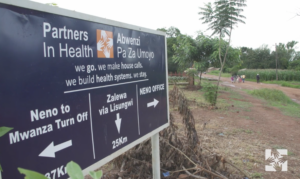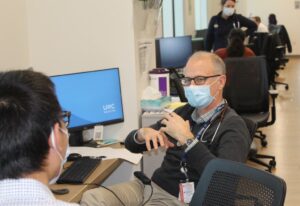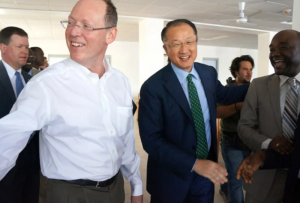“I’ve always felt fortunate that I encountered Paul and Jim Kim at a time when I wasn’t happy with the way the world looked. At 24, I had no idea what an alternative vision could be. Paul and Jim were able to articulate a more humane and just vision, for which I’ve always been grateful.”
AN INTERVIEW WITH BRIAN BRAMSON:
Brian Bramson was finishing his internal medicine residency at UNC in 2004. He planned to join the CDC’s Epidemic Intelligence Service, but as the time approached, he realized he was conflicted. He really liked clinical infectious diseases and decided do a fellowship. He had also been a Peace Corps volunteer in Tanzania, and he liked East Africa.
“I talked with Mike Cohen and the late Charlie Van der Horst about serving a large part of my fellowship working in Malawi. This was a time when there weren’t as many people who were available and comfortable working in that environment. They thought it was a good idea. I worked in Malawi for about 18 months of my fellowship. I was working with Charlie on a breastfeeding and anti-retroviral study.”
WHEN DID YOU DECIDE ON CLINICAL CARE?
“After my fellowship, I reached out to my medical school professor Paul Farmer. I had heard that Partners in Health (PIH) was opening up a site in Malawi and I went to work for Partners. At the time, my wife and I had three small kids and we didn’t end up doing that for long. Back in the States, I was trying to find something that I could do as a single parent that would give me more control over my schedule. This led me to being the clinical director of one community health center in Raleigh, followed by a stint as the chief of adult medicine at another, Lincoln Community Health Center in Durham. In this role, I put all my training to use, doing medicine and pediatrics, and at the Durham clinic, we had an HIV clinic. But after a while, I decided I wanted to go back to the hospital.

“I joined the UNC faculty in 2011, as a hospitalist. From time to time, I was approached to help out in both pediatric and adult infectious diseases services. Meanwhile, Joe Eron and others had suggested I do more clinical work with the ID Division. During this time, I was trying to figure out how to make that work with my schedule because by now I was a single father of three. I started to spend increasing time on the ID Consult Service, and I just really, really, enjoyed it. It was so much more what I liked doing and played to my strengths. As my boys got older, my schedule wasn’t as big a deal, and I was able to go full time.
“I ended up going from quarter time on the ID consult service to full time in the ID Division. Ironically, my first day of being full time was April 1, 2020, and my schedule was empty because of COVID. So, I ended up working on the inpatient COVID service, which was a lot of work. But it was interesting because this was the group that put together the inpatient treatment recommendations.
“I’ve been doing this now full time for just over two years. I’ve never been happier clinically.”
YOU WERE TAKING A GLOBAL HEALTH PATH, INITIALLY?
“That’s certainly what I thought I would spend most of my career doing. Sometimes things don’t always work out the way we expect. I do like that there are so many people in the division that have a global health focus and more essentially, an awareness of the intersection of health care and social justice. I feel like that awareness is becoming more prevalent throughout the profession generally. But I don’t think that’s anything that had to be taught to most people who have worked in in infectious diseases. That’s one area where all my colleagues have always been very, very aware of how much sheer economics and other big social factors impact who gets infected, and what kind of infections, and what kind of treatments.”

WHY DO SO MANY FELLOWS EITHER STAY AT UNC OR GO AWAY AND COME BACK?
“I think it’s because the leaders in this division have built a world class group of brilliant faculty, who are doing great things in North Carolina and globally. UNC Chapel Hill has one of the premier divisions of infectious diseases.
“It’s also because of the culture, which is a little harder to quantify. Nowhere else have I experienced a supportive and collegial culture like this institution, a lot of which is exemplified by the ID Division. I’ve been other places where there are brilliant and accomplished people, but it’s not the same. We have a nice combination of really great people to work with, who are supportive of each other. That’s not easy to find.”
WHAT DO YOU LIKE ABOUT WORKING IN INFECTIOUS DISEASES?
“I like being able to make a challenging diagnosis, to solve the mystery. I also like how this subspecialty crosses every other specialty. We get involved with everyone’s patients, and everyone comes to us at some point for help. I can’t imagine that it could ever get boring. We keep encountering new emerging pathogens that we have to learn about, and this keeps pushing us all the time. There’s also a degree of immediate gratification for cures or drastic improvements, which don’t always happen when you’re managing chronic illnesses, diabetes, hypertension.”

WHAT WAS IT LIKE WORKING WITH PAUL FARMER?
“I met him in 1995 during my first year of med school, and he always had a weird charisma about him. I would find myself getting into debates with him. Then, I’d walk away, replaying our conversation in my head. I’d realize he was right and I was wrong, which is what a good teacher is supposed to do by presenting challenging ideas. He changed the way I see the world. I was really fortunate to meet him when I did.
“I had spent two years in Tanzania in the early 90s, when East Africa was ground zero for the HIV pandemic. It was also when the Cold War had ended. After the Soviet Union collapsed, Eastern Bloc allied countries, of which Tanzania was one, saw neoliberal economic theories imposed on them. A lot of developing countries, Tanzania included, saw drastic changes to their economies and how public services were financed and restricted. I saw this play out often in ways that were really horrible, right in front of me, but I hadn’t quite figured out how to understand it, or what the alternative was. I’ve always felt fortunate that I encountered Paul and Jim Kim at a time when I wasn’t happy with the way the world looked. At 24, I had no idea what an alternative vision could be. Paul and Jim were able to articulate a more humane and just vision, for which I’ve always been grateful.”
WHAT IS SOMETHING YOU’RE PARTICULARLY PASSION ABOUT IN YOUR WORK?
“I teach the physical exam to residents. This has been a side project that I’ve been working on ever since I was in med school and suspected I’d be working in places where my bedside clinical skills would be called upon probably more so than they usually are in the States. I also started a course in advanced physical diagnosis when I was a med student, which I think is still being taught at Harvard.
“This is a skill set that we probably depend upon more often in infectious disease compared to other specialties. For example, if we’re examining a patient with a staph bloodstream infection, it’s really important to do a ridiculously thorough physical exam because you have to figure out where could the sites of infection could be. Is there a heart murmur? Does the patient have endocarditis? Is there tenderness over a joint? Could the patient have a septic arthritis that needs to be drained? All of these things have to be examined carefully so that you’re not missing something, in order to give your patient quality care. Sometimes I worry this skill set may not be reinforced as much as it could be.”
